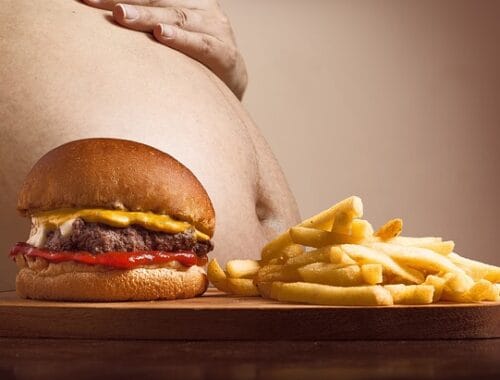
Find the root cause for your overweight!

Overweight and Obesity what is the difference? The WHO had given a definition based on Body to Mass Index (BMI), it is an index of weight-for-height.
BMI = Weight in Kilogram (kg)/ Height in square meters (m2)
- If BMI is greater than or equal to 25 treated as overweight.
- or BMI is greater than or equal to 30 treated as obesity.
Overweight and Obesity kills more people than under weight.
- Worldwide around 2 Billion or 40% of the adult population considered as overweight in 2016.
- America, China and India have occupied the first three places in the obese country list.
Harvard Medical studies and other research says that Your weight depends on the calories consumed for body function, excess calories stored in the body and how many you burn up. All these results of environment and genes. Both can affect how fast you burn calories and your lifestyle.
Factors which contributes to individual overweight or obesity:
The Calorie lines – Overweight
The storage and burning of calories in the body depend on your genetics, degree of physical activity and calories consumed while you take rest. If you are able to burn or consume all the calories in your body then your weight will be under control. Intake foods having more calories than your body demands, then you gain weight.
The excess calories are stored in the body in the form of fat. There are specialized cells in the body to store fat. The fat storage will be by enlarging the fat cells are generating new fat cells. You can burn these fat cells by reducing your food intake or by increasing calories demand with body exercises or workouts
Your Genetics
Today about 400 different genetics plays a role in overweight or obesity and few of them play a major role. And their influence can vary from person to person, few may affect only 25% and few many impacted 70% to 80%. Genes define your sense of fullness, food carving, metabolism body and fat distribution, and the tendency to use eating as a way to deal with stress.
Check your gene characteristics
Due to genes, you may have struck with overweight in most of your life, your parents or many relatives are overweight your likelihood of a falling under the same circle as high as 80%. Good physical activity also will not help you to reduce your overweight with gene influence.
You are moderately overweight, follow a diet plan and a workout program you can reduce your weight. You may gain your lost weight in holidays, change in your eating habits, physical activity or when you affected with psychological or social problem.
These suggest that you are heavily predisposed by the genes and not losing your weight with minimal efforts are not great news, your gen disposition is modest concerning obese and your weight is normal then your tendency to increase your weight even you consume much calories food and do exercise rarely.
This indicates that only moderately gene disposition people can have chances to lose their weight and maintain less weight.
Thrifty genes
When crops fail in our olden days our ancestors survive with stored fat in the body during the lean time and those who could not perish. This is the reason why today 85% of us carrying thrifty genes. In the present world, these thrifty genes are a curse rather than blessed. We have readily available food around the clock.
In case of highly gene disposition people able to lose weight that can be maintained for less time, they can only able to maintain normal weight under doctor guidance or with drugs or with surgery.
The obese population has been increasing in the United States since the 1970s, genes alone not responsible for this rise. The rise of the body mass index is not limited to certain geo zones across the world.
Environment and your overweight
Genes are internal to your body to help your weight and stay overweight; the environment is outside your body contributes to your body weight. Anything which makes us eat more and do a very little exercise.
Babies of mothers who smoked during pregnancy are more likely to become overweight than non-smoked pregnant mothers. The same is thru with the babies born to diabetic mothers. These conditions may affect the metabolism in the babies.
Childhood habits have many roles in the rest of our lives. Kids who attracted the taste of the soft drinks, eating high calorie processed foods and frequently consuming them which promotes overweight.
Babies who are not breastfed for more than three months are less likely to have obesity as adolescents.
Children who watch television and play video games instead of playing physical games may victim of sedentary future.

Food habits
As mentioned extra calories in your body will enlarge fat cells or creates new fat cells in the body. Indian an average person required 2100 to 2400 calories based on living area. The average man adding extra calories to his daily fare than enough, its due to increase food availability, bigger portions and more high-calorie foods.
Food is readily available in all shopping malls, cinema theatres and stadiums. You can buy snacks or meals on street hackers. The overall percentage of spending on food is increasing in many countries. In 1970, America spent 27% on food, by 2006 that percentage increased to 46%.
Always people interested to buy and whatever in front of them. Now fast-food restaurants increased meal size and the same trend is passed to other snacks. The French fries served at McDonald’s contains 3 times more calories than when it started. A single super-sized meal contains 1500-2000 calories along with these soft drinks and salty snacks add more calories.
The fat content in the diet is gone reduced; much low-fat food contains a high portion of carbohydrates which have a large amount of sugar that improve the taste.
Body Exercises
In regards to present food habits, everyone needs to do exercise for 45 min to one hour moderate to rigorous in a day. But very few involved in this activity. only 25% of Americans do exercise and 64% of Indians replied that they do not do exercise in a study.
There are many factors keeping people away from doing exercises type of work culture, office timings and transportation, other responsibilities, nature of the person and situations
Sedentary snacking
If you are watching more hours of television, research says that this habit linked to overweight or obesity. Watching TV more than two hours a day also a risk of overweight in children, even it results in 3 years kids.
Watching TV burns slightly more calories than sleeping. Part of this time can spend on exercise to burn calories. Food advertisements also on TV shows encourage to eat more.
Eating while watching TV stimulates people to eat more calories. Children ate more snacks while watching TV than when doing other activity.
Stress and Sleep
Many parents both working and spending long working hours unable to spend time with children. At the same time due to social issues like violence on children and abduction making stress in parents not to send their children to public parks for bike riding.
This kind of situations makes children stick to TV sets and video games. Which mean parents have less time for family obligations, due to time pressure, often lead people to eat on the run and less sleep both can contribute to weight gain.
Lack of sleep affects the release of the hormones that control hunger and appetite could cause obesity. Stress and lack of sleep are closely connected to psychological health, which can also affect diet and appetite. Some people will eat more when they are depression or anxiety that leads to weight gain or obesity.